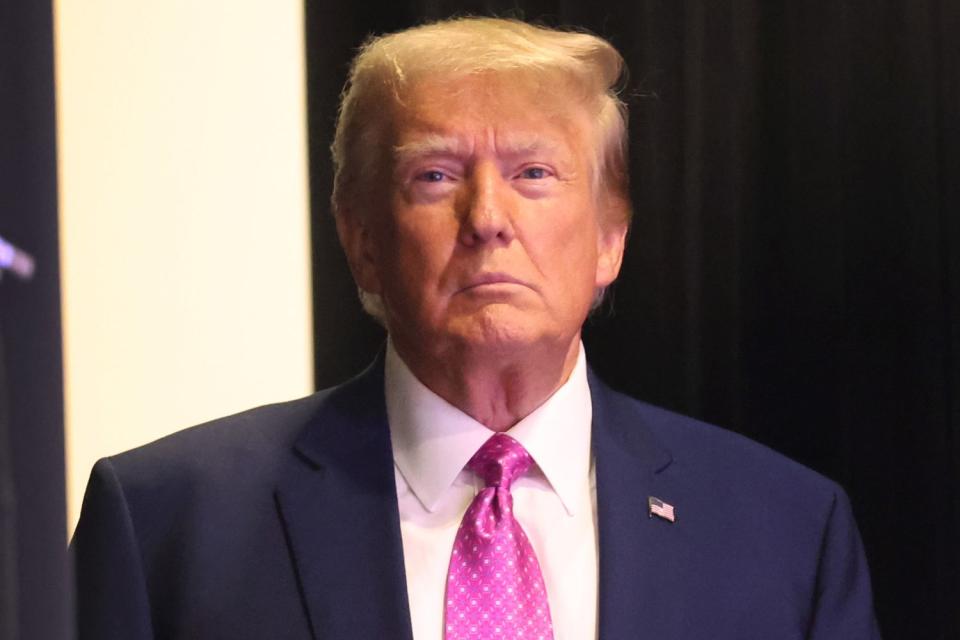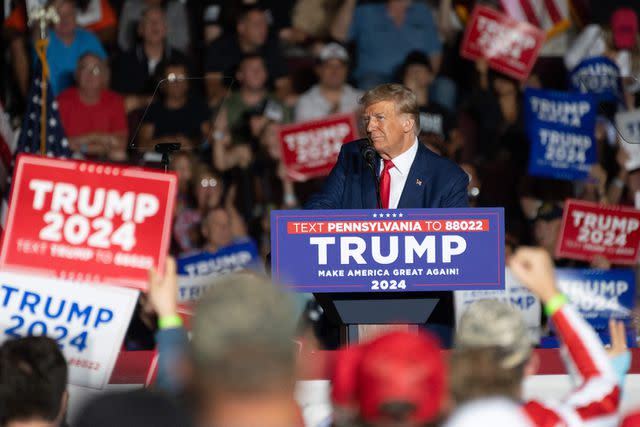Michigan Supreme Court Allows Trump to Stay on Primary Ballot After Colorado Disqualifies Him from Race
The state's highest court rejected an effort to disqualify Trump from the February primary based on the Constitution's little-used "insurrection clause"

Scott Olson/Getty Images
Donald TrumpDonald Trump will appear on Michigan's 2024 presidential primary ballot after the state's highest court rejected an attempt to disqualify him.
On Wednesday, the Michigan Supreme Court declined to reconsider an earlier Michigan Court of Appeals decision which allowed Trump, 77, to remain on the Republican presidential primary ballot. The group of voters who requested the Supreme Court's review argued that the former president should be disqualified from the ballot — and the presidency — under the Constitution's "insurrection clause," due to his alleged role in the Jan. 6, 2021, Capitol riot.
In its Wednesday order, the Michigan Supreme Court said it was "not persuaded" to consider overruling the lower court's ruling.

JOED VIERA/AFP via Getty
Donald Trump speaks at a 2024 campaign rally in Erie, Pennsylvania, on July 29, 2023The decision in Michigan comes just over a week after Colorado's Supreme Court disqualified Trump from appearing on its state's primary ballot.
Colorado's decision to ban the former president from the race was based on the same "insurrection clause" mentioned in the Michigan suit — Section 3 of the U.S. Constitution's 14th Amendment — which disqualifies individuals who have "previously sworn an oath to support the Constitution" and have "engaged in insurrection or rebellion" from holding office.
"A majority of the court holds that [former] President Trump is disqualified from holding the office of President under Section Three of the Fourteenth Amendment to the United States Constitution. Because he is disqualified, it would be a wrongful act under the Election Code for the Colorado Secretary of State to list him as a candidate of the presidential primary ballot," the state Supreme Court said in its opinion.
But as Axios reports, election law differs in Michigan and Colorado. Whereas Colorado removed him from the ballot after deeming him ineligible for the presidency, Michigan asserted that there is no provision in the state requiring a candidate to have "legal qualification" for office — in other words, even if Trump was deemed ineligible for the presidency, Michigan courts would not exercise control over his placement on the primary ballot.
The Colorado court's 4-3 decision stays until January 4, a day before the state's ballot certification deadline for its March 5 presidential primary. It marked the first time the so-called "insurrection clause" has been used to disqualify a presidential candidate, per the Associated Press.
The Colorado ruling overturns a November decision from District Judge Sarah B. Wallace, which allowed Trump to stay on the state's ballot but determined he "engaged in insurrection" during the deadly Capitol riots. The former president announced that he would appeal his recent disqualification in Colorado by asking the U.S. Supreme Court for a speedy review.
Never miss a story — sign up for PEOPLE's free daily newsletter to stay up-to-date on the best of what PEOPLE has to offer.
In August, Trump was indicted on four criminal counts by a federal grand jury investigating the Jan. 6, 2021, Capitol riot and other efforts to overturn the 2020 presidential election.
Per the indictment, Trump was charged with one count each of conspiracy to defraud the United States, conspiracy to obstruct an official proceeding, obstruction of and attempt to obstruct an official proceeding, and conspiracy against rights.
The former president has been charged in four separate criminal cases since leaving office, each of which are awaiting trial.
For more People news, make sure to sign up for our newsletter!
Read the original article on People.


